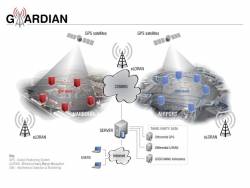
Spirent Communications plc’s Positioning Technology Unit has announced the GSS200D Interference Detection and Analysis solution, developed as part of Spirent’s partnership with Nottingham Scientific Limited.
The GSS200D comprises field-based hardware and a secure data server for automatic capture and analysis of GNSS radio frequency interference. According to the Paignton, UK–based company, deployments of GSS200D probes provide users with a thorough understanding of the RF interference (RFI) environment at sites of interest.
Spirent Communications plc’s Positioning Technology Unit has announced the GSS200D Interference Detection and Analysis solution, developed as part of Spirent’s partnership with Nottingham Scientific Limited.
The GSS200D comprises field-based hardware and a secure data server for automatic capture and analysis of GNSS radio frequency interference. According to the Paignton, UK–based company, deployments of GSS200D probes provide users with a thorough understanding of the RF interference (RFI) environment at sites of interest.
Operating simultaneously on GPS, GLONASS, and Galileo in the L1 band, the GSS200D’s functionality enables a wide range of users, such as critical infrastructure communications, broadcast and power distribution, civil aviation, road user charging and autonomous vehicles to detect, characterize, and classify RFI sources that may affect their services, the company says.
Captures of RFI events are logged and stored on PT Cloud, Spirent’s secure cloud infrastructure, allowing the end user confidential access to the results via a web portal. Advanced analytics and reporting features include visualization of both spectrogram and spectrum, as well as characterization of the type and priority of interferences, enabling monitoring over time and in-depth trend analysis, according to Spirent. On-premise server options are also available.
Spirent has already detected thousands of disruptive GPS L1 interference events with its global network of GSS100D detectors. By adding support of additional frequencies and constellations, as well as improving the analysis and reporting, the company is targeting the GSS200D at critical infrastructure and civil aviation customers.





